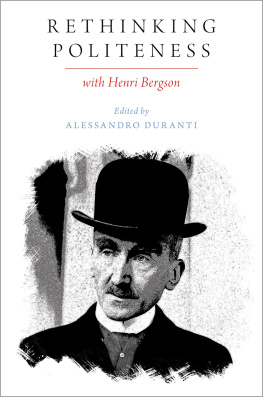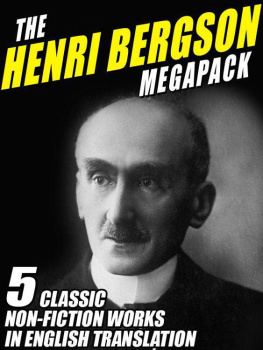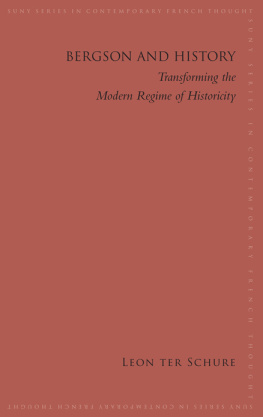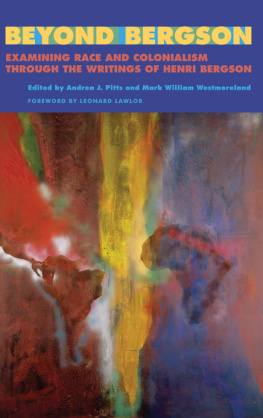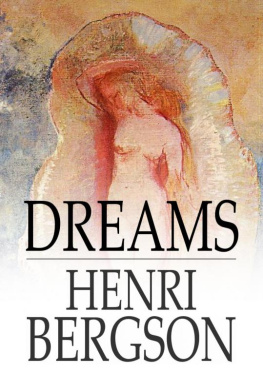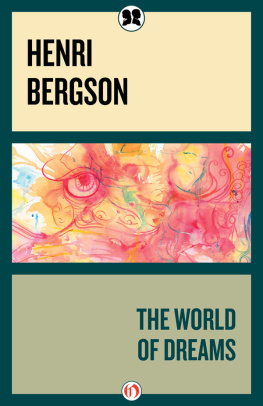Rethinking Politeness with Henri Bergson
OXFORD STUDIES IN THE ANTHROPOLOGY OF LANGUAGE
Series editor: Alessandro Duranti, University of California, Los Angeles
This series is devoted to works from a wide array of scholarly traditions that treat linguistic practices as forms of social action.
Editorial Board
Patricia Baquedano-Lpez, University of California, Berkeley
Donald Brenneis, University of California, Santa Cruz
Paul B. Garrett, Temple University
Janet McIntosh, Brandeis University
Justin Richland, University of California, Irvine
Thank You for Dying for Our Country: Commemorative Texts and Performances in Jerusalem
Chaim Noy
Singular and Plural: Ideologies of Linguistic Authority in 21stCentury Catalonia
Kathryn A. Woolard
Linguistic Rivalries: Tamil Migrants and Anglo-Franco Conflicts
Sonia Neela Das
The Monologic Imagination
Edited by Matt Tomlinson and Julian Millie
Looking like a Language, Sounding like a Race: Raciolinguistic Ideologies and the Learning of Latinidad
Jonathan Rosa
Talking Like Children: Language and the Production of Age in the Marshall Islands
Elise Berman
The Struggle for a Multilingual Future: Youth and Education in Sri Lanka
Christina P. Davis
The Last Language on Earth: Linguistic Utopianism in the Philippines
Piers Kelly

Oxford University Press is a department of the University of Oxford. It furthers the Universitys objective of excellence in research, scholarship, and education by publishing worldwide. Oxford is a registered trade mark of Oxford University Press in the UK and certain other countries.
Published in the United States of America by Oxford University Press
198 Madison Avenue, New York, NY 10016, United States of America.
Oxford University Press 2022
All rights reserved. No part of this publication may be reproduced, stored in a retrieval system, or transmitted, in any form or by any means, without the prior permission in writing of Oxford University Press, or as expressly permitted by law, by license, or under terms agreed with the appropriate reproduction rights organization. Inquiries concerning reproduction outside the scope of the above should be sent to the Rights Department, Oxford University Press, at the address above.
You must not circulate this work in any other form and you must impose this same condition on any acquirer.
Library of Congress Control Number: 2021951869
ISBN 9780197637869 (pbk.)
ISBN 9780197637852 (hbk.)
ISBN 9780197637883 (epub.)
DOI: 10.1093/oso/9780197637852.001.0001
Contents
Alessandro Duranti
Henri Bergson
Alessandro Duranti
Mahalia Gayle
Judith T. Irvine
Aliyah Morgenstern
Graham M. Jones
Terra Edwards
Kamala Russell
Keith M. Murphy
Jason Throop
William F. Hanks
When I discovered Henri Bergsons lecture La politesse during a stay in Paris over a decade ago I was so taken by it that I kept bringing it up in conversations and talks. To my surprise, colleagues in both France and the United States did not seem to have heard of it. I wondered what it would take to make it better known. With the encouragement of my editor at Oxford University Press, Meredith Keffer, I secured an English translation by an expert on Bergson and his times, Mahalia Gayle. The next step was to find scholars who would be interested in collectively reflecting on Bergsons ideas on civility and sympathy. Given that colleagues who had written about politeness in the past had moved on to other topics, I decided to contact scholars who could approach politeness afresh, as if thinking about it for the first time. But how to convince them to put aside whatever they were working on to engage with a century-old text by a once famous French author no longer on reading lists of courses in the humanities or social sciences? The turning point was a conversation in Berkeley with Bill Hanks after he had read Bergsons lecture. I was happy to discover that Bill felt the way I did about the tremendous potential in Bergsons recommendations about politeness to French high school students. With Bills endorsement and Jason Throops equally strong enthusiasm for the opportunity to rethink ethics along with and through Bergsons correspondence with William James, I now had the beginning of a panel at the 2019 annual meetings of the American Anthropological Association in Vancouver. The final lineup of speakers turned out to be an impressive multigenerational group of scholars: Judith Irvine, Graham Jones, Terra Edwards, Kamala Russell, Jason Throop, and Bill Hanks. They kept the audience fascinated from the first to the last word. A few months later, three more authorsMahalia Gayle, Aliyah Morgenstern, and Keith Murphyjoined the Bergson project, and a book started to take shape. The outcome is a series of dialogic engagements with Bergsons ideas. I am grateful to the contributors for making Bergsons text relevant to contemporary concerns and to a much broader domain of inquiry than I could have imagined on my own. Special thanks also go to two anonymous reviewers and to Don Brenneis, who helped guide the editorial process in collaboration with Meredith Keffer.
AD
Alessandro Duranti is Distinguished Professor of Anthropology at the University of California, Los Angeles. He has published extensively on political discourse, greetings, improvisation in language and music, intentionality, and agency. His books include From Grammar to Politics: Linguistic Anthropology in a Western Samoan Village (1994), Linguistic Anthropology (1997), and The Anthropology of Intentions: Language in a World of Others (2015).
Terra Edwards is a linguistic anthropologist in the Department of Comparative Human Development at the University of Chicago. Her research is concerned with the existential and environmental conditions that support language emergence. Since 2006, she has been pursuing this interest with DeafBlind communities in the United States. Her most recent works have been published in Language, Frontiers in Psychology, and the Journal of Linguistic Anthropology.
Mahalia Gayle is an independent scholar, teacher, and translator. Born and raised in Seattle, she earned a B.A. at Princeton University and an M.A. and PhD at Harvard University in Romance Languages and Literatures. Her work moves between contemporary and ancien rgime France, with a focus on the intersection between politeness and human rights. Other interests include the politics of reading and the relationship between language, identity, and authority.
William F. Hanks holds the Berkeley Distinguished Chair in Linguistic Anthropology at University of California, Berkeley. A specialist of Yucatec Maya, his work investigates deixis and indexicality, the linguistic consequences of colonization, and the language and practice of contemporary Maya shamanism. His works include Referential Practice, Language and Lived Space among the Maya (1990), Language and Communicative Practice (1996), and Converting Words, Maya in the Age of the Cross (2010).
Judith T. Irvine is Edward Sapir Distinguished University Professor of Anthropology Emerita at the University of Michigan. Her research focuses on language and communication in social, cultural, and historical contexts. She has done ethnographic, linguistic, and sociolinguistic fieldwork in Africa; research on the colonial history of African linguistics; and theoretical work on ideologies of language. She recently published

